

Prospects.ac.uk. Skills Development and Career Planning Books. YourGuideToGettingAJob. The gig guide: A new model of work? Hoping for long-term, secure employment with one organisation?
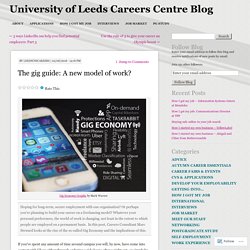
Or perhaps you’re planning to build your career on a freelancing model? Whatever your personal preferences, the world of work is changing, not least in the extent to which people are employed on a permanent basis. In this post, Careers Consultant Marc Steward looks at the rise of the so-called Gig Economy and the implications of this. If you’ve spent any amount of time around campus you will, by now, have come into contact with Uber; either through ordering a ride home after a night out, or simply by trying to avoid being run over by one of their more “excitable” drivers. Ubiquitous, they are! You may or may not know, however, that Uber are probably the best proponents of the Gig Economy, a business model where “…temporary positions [of work] are common and employers contract with independent workers for short-term engagements.”
Why “Gig Economy”? Benefits for the individual Benefits for the employer Future trends Like this: How to make the most of your summer work experience. It’s that time of year again when students on their summer break begin work experience placements.
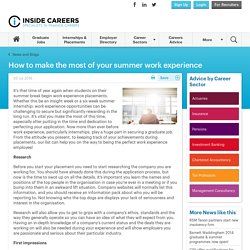
Whether this be an insight week or a six week summer internship; work experience opportunities can be challenging to secure but significantly rewarding in the long run. It’s vital you make the most of this time, especially after putting in the time and dedication to perfecting your application. Now more than ever before work experience, particularly internships, play a huge part in securing a graduate job. From the attitude you present, to keeping track of your achievements during placements, our list can help you on the way to being the perfect work experience employee!
Research. 5 mistakes to avoid in your placement search. Saad Ali is a final year student doing an integrated masters (MEng) in Mechanical Engineering.
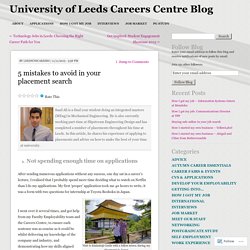
He is also currently working part-time at Slipstream Engineering Design and has completed a number of placements throughout his time at Leeds. In this article, he shares his experience of applying to placements and advice on how to make the best of your time at university. Not spending enough time on applications After sending numerous applications without any success, one day sat in a career’s lecture, I realised that I probably spend more time deciding what to watch on Netflix than I do my applications.
My first ‘proper’ application took me 40 hours to write, it was a form with two questions for internship at Toyota Boshoku in Japan. Visit to Kinkakuji Castle with a fellow intern during my placement in Japan Many placement applications consist of online tests, CV, covering letter, and competency questions. Applications and Interviews - Students - Careers Service. Interview Tips: What Drives Interview Selection Panels Mad - Careers Advice. There is a great deal of advice on applying for jobs and being interviewed.
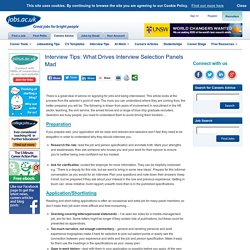
This article looks at the process from the selector’s point of view. The more you can understand where they are coming from, the better prepared you will be. The following is drawn from years of involvement in recruitment in the HE sector, teaching, the civil service, the armed forces and a range of blue chip graduate recruiters. The strength of strengths based recruitment. Jobmi. Career Planner. EY Strengths Assessment. GetthatJob Guideforgraduateswithdisabilities.
Full disclosure: When should you reveal a disability at work? The OED defines "disclosure" as the action of making new or secret information known.
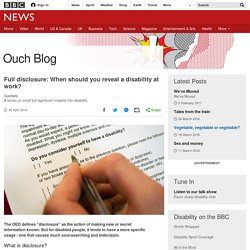
But for disabled people, it tends to have a more specific usage - one that causes much soul-searching and indecision. Requesting Adjustments: Your ‘Openness Statement’ While the academic term may have finished, for those who have been applying for graduate jobs the hard work continues as you begin to prepare for your interviews and assessment centres.
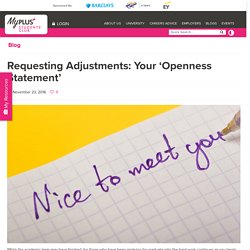
In addition to practicing online tests and how to answer interview questions, if you require a change or adjustment to the process, you will also need to be thinking about how you are going to ask for what you need. What Is Reasonable Employers often talk about ‘reasonable’ adjustments but how do you know what is reasonable to ask for? A good question to ask yourself is ‘what do I need in order to demonstrate my potential?’
The key word here is ‘need’; if you need it rather than simply want it, it is likely to be reasonable.
Applications and interviews. Choosing an employer. What skills do employers want? Your degree will have taught you a host of subject-specific and transferable skills and knowing how to sell them to employers is vital in a competitive job market While the knowledge and skills required may vary from job to job, it's imperative that in your application forms you convey how you've gained the core attributes that you think would make you a worthwhile addition to the organisation.
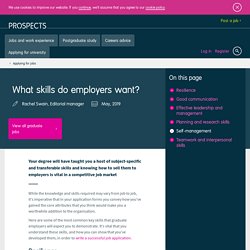
What skills do graduate employers look for? InLeeds Day 2018. Employability. Cookies on the Key Note website.
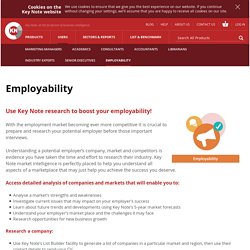
Competencies. Preserving Integrity - Career Development From MindTools.com. Consistently Making the Right Choices © iStockphotoHPuschmann Preserve your integrity.

You do not wake up one morning a bad person. It happens by a thousand tiny surrenders of self-respect to self-interest. – American writer, Robert Brault.
Psychometric tests. A guide to: Interviews & Assessment Centres. Interviews. Assessment Centres. Job offers (The University of Manchester) You’ve been offered a job, congratulations!
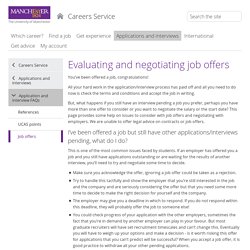
All your hard work in the application/interview process has paid off and all you need to do now is check the terms and conditions and accept the job in writing. "Help! I have multiple job offers, what do I do?" Is this you? Did you know you can sign up for a free account with RateMyPlacement? This way you’ll get alerted about the latest, greatest student placements and internships and plenty more besides. Find out about the full benefits of signing up and register on this page. 6 steps to dealing with multiple job offers. While the job market for the majority of sectors across the globe, generally speaking, is in a lot better place now than it was five years ago, you’d still consider yourself fortunate to receive multiple job offers.
The problem is that, while having options is a blessing, many jobseekers don’t know how to deal with more than one offer without damaging their relationships with the organisations whose offers they decide not to accept. Six steps to job search success It’s a delicate process of course, but what a problem to have. Fortunately there are a few processes you can follow to ensure you not only don’t offend anyone when considering your various options, but also that you make the right decision.
Here are six steps you can take to successfully deal with multiple job offers: 1. How to respond to job rejection. Being on the receiving end of a job rejection can make maintaining a positive attitude extremely difficult. However, there are many things you can do to keep your spirits up Whether you're struggling to land an interview or falling at the final hurdle, the latter stages of finding a job can be disheartening. Indeed, many students and graduates overlook the sheer competitiveness of the application stage; with some allowing several knockbacks to destroy their confidence entirely.
Employment. First Job your first month survival guide Mark Blayney. Advice & Guidance. Acasorguk. Guardian Graduate. Guardian Careers. Acas Learning OnLine.